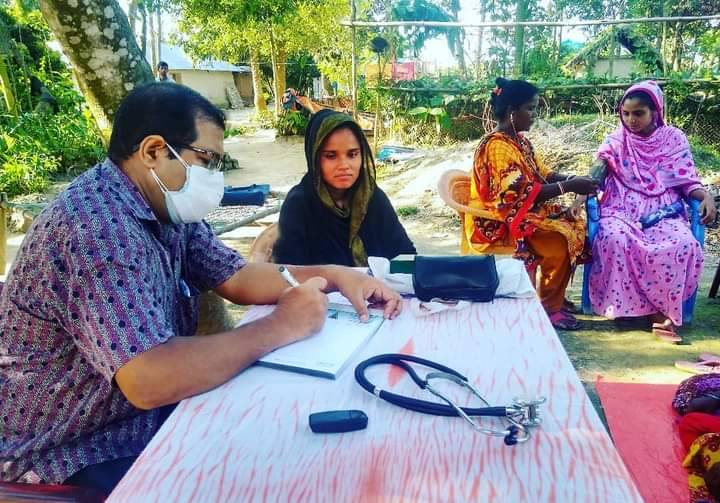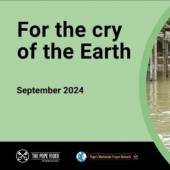Bangladesh: Rise in Sickness due to Climate Change

A new report says that climate change increases physical and mental health issues.
Warmer climates lead to a surge in infectious diseases in Bangladesh as children and older adults living in cities are the most vulnerable group to it, according to a World Bank report.
The "Climate Afflictions Report" also finds a link between the shifting climatic conditions and the increase in respiratory, waterborne, and mental health issues.
Dr. Edward Pallab Rozario, President of the Association of Bangladesh Catholic Doctors (ABCD), said, "Due to climate change, the health impacts are huge and people suffer, especially children's and old people."
"Especially tropical diseases like Dengue Fever, Tuberculosis, Typhoid, Malaria, Skin Diseases, Cancer, Diabetes, Hypertension – Non –Communicable Diseases, Mental Diseases, and Respiratory Diseases, etc. will increase," said Dr. Edward.
He added, "As a Family Medicine Specialist, in Bangladesh especially in Dhaka, we are getting more Dengue fever patients nowadays. Health officials in Bangladesh reported an additional 234 dengue fever hospitalizations last week, bringing the country's total to 15,065 since the beginning of the year, with the vast majority of cases seen since July. In July, we saw 2,286 hospitalizations and in August, 7,698. And in Dhaka city, we saw most of the new cases, 214, according to the Directorate General of Health Services (DGHS)."
In addition, the city accounts for some 88 percent of the total cases at 13,314 since the beginning of the year and now, last month, 57 dengue deaths were reported, with 53 from Dhaka city. We have also lost a few Catholics in Dhaka due to dengue fever.
Mental Health Diseases also increased here in Bangladesh due to climate change and the Covid-19 pandemic. In a nearby Catholic Parish at Dhaka, around 4 suicides were held among young people.
Bangladesh Church also takes the initiative by which ways forward to overcome this scenario.
"We need to plant more trees to make the world Chloro fluoro carbon (CFC) free and green. Bangladesh Church planted around 400,000 l trees throughout the country to follow the call of Pope Francis and his open call to save our mother Earth in the Laudato Si.” A church leader said.
During the Celebrating the "Season of Creation," Bishop Gervas Rozario said, "Urged the faithful to create a "clean and green environment" and to deepen "our love to take action to care for our common home so that we can solve many problems."
Day-by-day domestic violence is increasing in Bangladesh due to climate change for their mental distress. Bangladesh is one of the most climate change vulnerable countries, says the report.
Shedding light on Bangladesh's vulnerability to changing climate conditions, Mercy Tembon, World Bank country director for Bangladesh and Bhutan, said, "With more evidence showing a pronounced impact of climate change on physical and mental health, Bangladesh needs to build on its success in adaptations to ensure a stronger health system that averts outbreaks of emerging climate-sensitive diseases."
Over the past 44 years, Bangladesh experienced a 0.5 degrees Celsius rise as the summers are getting hotter and longer. Meanwhile, winters have turned shorter and warmer while the monsoons are being extended from February to October.
With the changing climate patterns, the country's distinct seasonal variations are becoming blurred. By 2050, the country's temperatures are predicted to rise by 1.4 degrees Celsius.
According to the research findings, urban areas and cities are more prone to vector-borne diseases and respiratory illnesses. The changing weather patterns also affect mental health.
It said more people suffer from depression during winter while anxiety disorders increase with temperature and humidity. Besides, women are at higher risk of depression than men, while men are more susceptible to anxiety.
Bangladesh is experiencing erratic weather patterns along with a sustained rise in temperature and precipitation. Evolving climatic conditions have had detrimental effects on physical and mental health, leading to increased prevalence and variation of infectious diseases and mental health issues such as depression and anxiety disorders.
Radio Veritas Asia (RVA), a media platform of the Catholic Church, aims to share Christ. RVA started in 1969 as a continental Catholic radio station to serve Asian countries in their respective local language, thus earning the tag “the Voice of Asian Christianity.” Responding to the emerging context, RVA embraced media platforms to connect with the global Asian audience via its 21 language websites and various social media platforms.














